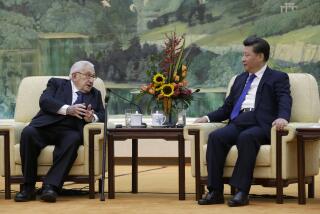An Identity Crisis Inside Soviet Union
- Share via
Former Secretary of State Henry A. Kissinger was interviewed late last month by writer Marc Ullmann of Paris Match. These are excerpts from that session:
Ullmann: Can the transformation of communism occur peacefully and can the Soviet national state be kept together in more or less historic national boundaries?
Kissinger: That is the big question, more important than arms control and many other issues of day-to-day diplomacy. The second big question is whether you go from a centrally planned economy to a market economy without the turmoil that threatens political cohesion.
I don’t think anybody knows whether the Soviet nationalism problem is manageable. The Russian empire never found a way of governing except by Russian domination of the non-Russian population. The difference between the Russian empire and the European empire is that the Russian empire is contiguous to the Russian population. My instinct is that if it begins to look as if the historic Russian empire is disintegrating, there will be an assertion of state authority, by the army , the party--or a combination of both. I do not believe they will let it disintegrate without fighting.
Q: Would the Ukraine be a more severe test than the Muslim regions?
A: The Muslim populations are the most immediate test, but Soviet leaders may still believe that they can balance domination of the Muslim populations with local autonomy--and maybe they can. They may be prepared to make major experiments in Muslim areas but will not make the same experiments in the Ukraine.
In the Baltic republics they are willing to take chances because the Baltic peoples are culturally and historically different from the Russian people; theoretically the Soviets can experiment with market conditions there without risking large migrations of Russians to share in any good economic results. But that depends on whether the Baltic countries are satisfied with autonomy and a higher standard of living, or whether they will want total independence. That is where I suspect the Soviet Union would draw the line.
Q: There are all sorts of experiments in Poland and Hungary; what are the limits the Soviet Union can accept there?
A: The potential crisis in European diplomacy is in managing the evolution of the East European countries. My instinct is that if these countries should try to leave the Warsaw Pact, that would mean an end to Soviet patience.
One can make a case that if the Soviet Union identifies its security with communist governments in Eastern Europe, then it assumes a permanent position of policeman, subject to crises it does not control. The Soviets would risk all their public-opinion achievements in Western Europe if they were driven--or even tempted--into repression.
Ideally, the East Bloc countries should be free to leave the Warsaw Pact. I suspect that the best way to approach this is in stages, to say that as part of existing arms-control negotiations the Soviets have to withdraw from Czechoslovakia and from Hungary but may keep certain forces in East Germany and Poland if they commit to evolution toward pluralistic forms that leave those countries free to determine their political future.
That still leaves the problem of the German Democratic Republic (East Germany). In Poland and Hungary it is possible to identify security with national independence toward East and West. The German Democratic Republic could not survive as a state once the Communist Party accepts minority status.
The West European countries have an interest in peaceful evolution within a European context and not a German national context; in a German national context it is less likely to be peaceful.
Napoleon once said, “If you want to take Vienna, take Vienna.” It follows that if you want to conduct foreign policy, conduct foreign policy. So we have to solve our foreign policy problems with the Soviet Union. It is naive to believe that by intervening, benevolently or not, in Soviet internal affairs we can affect foreign policy. Not even the Soviets understand what they are starting.
The future can go in one of two directions. The Soviet Union will disintegrate or it will become very strong by succeeding with its economic reforms. If the Soviet Union disintegrates, which is not in our interest in my view, there will be unforeseeable international consequences.
If perestroika succeeds, it is naive to think the issues that could not be settled when the Soviets were weak can be settled when the Soviets are strong. Therefore the basic problem has not changed. The question is whether the smaller states on the Soviet periphery can live in equilibrium with that colossus of an empire embracing 11 time zones. That problem has never been settled. It needs to be settled now.
Q: Do you see a possibility of a backlash against Mikhail S. Gorbachev reforms--would he lead such a backlash himself?
A: Either could happen. He could try to lead the backlash, and given the powerful position he has developed, it’s not out of the question. Or they could get rid of him. I like him better than any other Soviet leader I have met, but I would be careful not to tie Western policy to one Soviet leader.
I believe that should Gorbachev die or be replaced, the next Soviet leader would face the same necessities. He might not operate with the same psychological skill, but if he were realistic he would have to act in the same manner.
More to Read
Sign up for Essential California
The most important California stories and recommendations in your inbox every morning.
You may occasionally receive promotional content from the Los Angeles Times.













